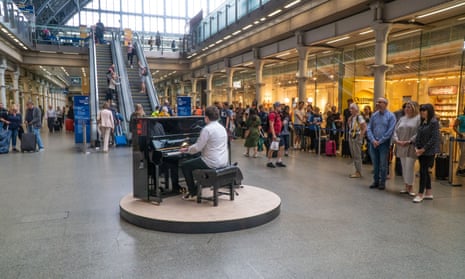Is there an instrument with more emotional range than the piano? Sometimes, it is tough to believe that the same collection of wood and wires can make you stamp your feet with delight one minute and wipe away a tear the next. But that’s exactly what happens in The Piano, the perfect showcase for the instrument’s versatility. So far, the show has been to railway stations in London and Leeds, treating crowds of commuters to everything from Debussy to Darude – with London playing host to virtuosos as young as 11 and as old as 92.
And, spoiler alert, there’s plenty to applaud and get misty-eyed about. Take Daniel, the 14-year-old who describes himself as “quite shy” and then belts out a heartstring-twanging version of the Goo Goo Dolls’ Iris with an octave-jump that gets the crowd applauding. Or 71-year-old Liam, who has built a shed on wheels to haul his own upright around, holding back his own tears as he plays a Chopin nocturne, and explaining via voiceover that the instrument is “not always an easy friend, but a great friend”. Reader, did I even get a little lump in my throat when Christopher the waistcoat-wearing pub pianist was (quite kindly) told to stop singing by host Claudia Winkleman, and immediately found a new level to his performance on the keys? I’m not ashamed to tell you that I absolutely did.
And then there’s Lucy. Thirteen-year-old Lucy was diagnosed with cancerous tumours of the eyes after she was born and has no vision. She is also developmentally delayed, meaning that she can’t hold a conversation. But when she was young, she played Twinkle Twinkle Little Star on a toy piano in hospital – so well that the nurses assumed it was pre-recorded – and since then, she has been using the piano to communicate in a way that she might otherwise find impossible. Working with a teacher from the Amber Trust, she puts her hands on top of his to feel the correct way to play – and when she sits down at the station piano, the results are mesmerising.
Watching her play Nocturne in B flat minor by Chopin, the show’s judges Mika and Lang Lang are uncharacteristically speechless, the station crowd falling silent as she plays with a dexterity and delicacy that many professionals don’t have. “You can be a great pianist, but if you’re always performing, sometimes the emotion becomes less genuine,” says Lang Lang, once he recovers. “But she plays so beautifully, and that emotion is so sincere.”
My five-year-old’s review was shorter: “How can she do that? That’s incredible” – and that’s really the beauty of the whole show. Watching the crowds cry, or clap, or tap their feet, it’s impossible not to wonder how many of those train travellers – or the audience at home – are seeing something that looks like fun, something that they could have a go at, or something that felt out of reach until they saw a self-taught bricklayer playing his own compositions, or a 21-year-old mechanic making St Pancras station jump with boogie woogie improv. Mika and Lang Lang (hiding near a champagne bar in episode one, and next to the station toilets by episode two) riff off each other brilliantly, with the chart musician providing a perfect bridge between the worlds of pop and classical music for his virtuoso fellow judge. “I promise, this is not what Abba’s supposed to sound like,” he says as a duo sing over one another during a cover of Dancing Queen, in what is probably the most scathing moment of criticism in the entire show.
Because, in the end, The Piano is the absolute opposite of a Simon Cowell-produced talent show. You show up just for the love of playing, and then – surprise! – you didn’t know you were in a competition, but you’ve actually already won, because you get to meet the world’s greatest pianist, who has been listening to you all along. Then it turns out that there’s a concert at London’s Royal Festival Hall and only one person gets to perform, but – surprise again! – that doesn’t really matter, because you still all get to jam out together at the end of the show, sharing your love for your instrument before you get a ticket to the concert anyway.
It is not about who’s the best; it’s about doing something to the best of your ability because it improves your life, and if you can watch it without wanting to run out and practise a thing that brings you joy, I will be very surprised. I don’t think my own choppy rendition of the Jurassic Park theme is going to bring anyone on a railway station concourse to tears, but I’ll be brushing up on it while I wait for episode three.
after newsletter promotion

